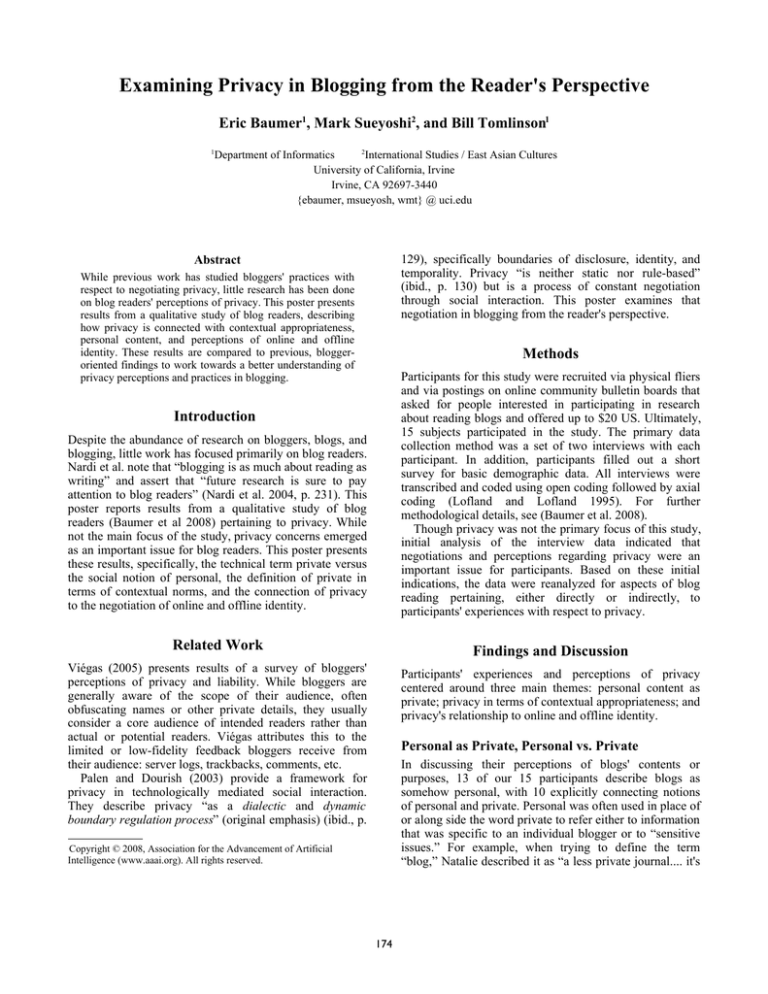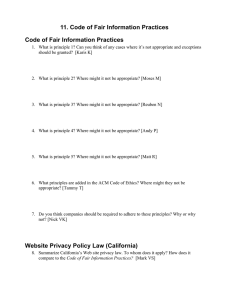
Examining Privacy in Blogging from the Reader's Perspective
Eric Baumer1, Mark Sueyoshi2, and Bill Tomlinson1
2
Department of Informatics
International Studies / East Asian Cultures
University of California, Irvine
Irvine, CA 92697-3440
{ebaumer, msueyosh, wmt} @ uci.edu
1
129), specifically boundaries of disclosure, identity, and
temporality. Privacy “is neither static nor rule-based”
(ibid., p. 130) but is a process of constant negotiation
through social interaction. This poster examines that
negotiation in blogging from the reader's perspective.
Abstract
While previous work has studied bloggers' practices with
respect to negotiating privacy, little research has been done
on blog readers' perceptions of privacy. This poster presents
results from a qualitative study of blog readers, describing
how privacy is connected with contextual appropriateness,
personal content, and perceptions of online and offline
identity. These results are compared to previous, bloggeroriented findings to work towards a better understanding of
privacy perceptions and practices in blogging.
Methods
Participants for this study were recruited via physical fliers
and via postings on online community bulletin boards that
asked for people interested in participating in research
about reading blogs and offered up to $20 US. Ultimately,
15 subjects participated in the study. The primary data
collection method was a set of two interviews with each
participant. In addition, participants filled out a short
survey for basic demographic data. All interviews were
transcribed and coded using open coding followed by axial
coding (Lofland and Lofland 1995). For further
methodological details, see (Baumer et al. 2008).
Though privacy was not the primary focus of this study,
initial analysis of the interview data indicated that
negotiations and perceptions regarding privacy were an
important issue for participants. Based on these initial
indications, the data were reanalyzed for aspects of blog
reading pertaining, either directly or indirectly, to
participants' experiences with respect to privacy.
Introduction
Despite the abundance of research on bloggers, blogs, and
blogging, little work has focused primarily on blog readers.
Nardi et al. note that “blogging is as much about reading as
writing” and assert that “future research is sure to pay
attention to blog readers” (Nardi et al. 2004, p. 231). This
poster reports results from a qualitative study of blog
readers (Baumer et al 2008) pertaining to privacy. While
not the main focus of the study, privacy concerns emerged
as an important issue for blog readers. This poster presents
these results, specifically, the technical term private versus
the social notion of personal, the definition of private in
terms of contextual norms, and the connection of privacy
to the negotiation of online and offline identity.
Related Work
Findings and Discussion
Viégas (2005) presents results of a survey of bloggers'
perceptions of privacy and liability. While bloggers are
generally aware of the scope of their audience, often
obfuscating names or other private details, they usually
consider a core audience of intended readers rather than
actual or potential readers. Viégas attributes this to the
limited or low-fidelity feedback bloggers receive from
their audience: server logs, trackbacks, comments, etc.
Palen and Dourish (2003) provide a framework for
privacy in technologically mediated social interaction.
They describe privacy “as a dialectic and dynamic
boundary regulation process” (original emphasis) (ibid., p.
Participants' experiences and perceptions of privacy
centered around three main themes: personal content as
private; privacy in terms of contextual appropriateness; and
privacy's relationship to online and offline identity.
Personal as Private, Personal vs. Private
In discussing their perceptions of blogs' contents or
purposes, 13 of our 15 participants describe blogs as
somehow personal, with 10 explicitly connecting notions
of personal and private. Personal was often used in place of
or along side the word private to refer either to information
that was specific to an individual blogger or to “sensitive
issues.” For example, when trying to define the term
“blog,” Natalie described it as “a less private journal.... it's
Copyright © 2008, Association for the Advancement of Artificial
Intelligence (www.aaai.org). All rights reserved.
174
not going to be as personal.” Similar sentiments were
expressed by Laura, who believes that “sensitive issues”
and “personal stuff” belong on a separate, private blog, not
a blogger's primary, topical blog.
The relationship between the terms private and personal
merits attention. Many blogging sites use “private” as a
technical term, referring to specific settings or rules about
who can access what content. With this meaning of the
word private, it could be incongruous to refer to a sensitive
discussion as private unless a post containing the content
had been set as private by the blog author. Thus, the use of
the word “personal” may be a way of getting around the
overloading of the term private, similar to the overloading
of the term friend on social network sites (boyd 2006).
about her relationships a lot online and she direct [sic]
them anonymously, but you would know..., who she was
talking about–it felt kind of annoying.”
Lillian, who generally associated online activity with her
knitting interest and offline identity with her professional
science career, was initially uncomfortable expressly
connecting the two. As a blog reader, she does not
“necessarily want science life to be linked with knitting
life,” and so does not comment on the blogs she reads by
scientists or science professors. However, “in terms of
blogs being an important part of [her] life, [she doesn't]
hide it from [her] family or anything like that,” neither
entirely merging nor entirely severing her offline and
online identities.
Despite interconnections between online and offline
identity, the two are in some ways still separate and
distinct. According to Lillian, the public of online is often
the private of offline, and vice versa. In this way, the
content on blogs dances the border between being public
and private. On the one hand, it is public, in that anyone
can read it. On the other, it is private, because the content
of blogs is often not a topic for face-to-face discussion.
Contextual Appropriateness
In the data from our study, the contextual definition of
privacy (Palen and Dourish 2003; Viégas 2005) at times
intermingled it with other concerns in nuanced ways.
One such concern was social acceptability. For Lillian,
there are “certain things [she] can handle, but not like, 'I've
been trying to get pregnant forever and I can't'.” Fern goes
so far as to avoid reading content that she considers too
personal. Here, a blogger has made something publicly
available, but the reader decides that this content is too
personal and should remain private. Although no other
participants explicitly mentioned not reading overly
personal content, 6 mentioned specific times when they
thought that a blogger was being too personal and hinted
that such content was not something they wanted to read.
The acceptability of the same content for a given reader
may also vary at different times. Cheryl reads a blog with
commentary on popular culture, but occasionally the
blogger writes posts about his cats. While she initially
“thought it was a little nutty,” as she became a regular
reader and got to know the blogger, the cat posts became
less annoying and even endearing. This blogger was
engaged in creating a particular online identity. Though
they initially seemed inappropriate, as Cheryl became more
familiar with the blogger, the cat posts ceased to be too
personal and became an integral part of the blogger's
identity. In this instance, privacy negotiations occurred
simultaneously along both temporal and identity
boundaries (Palen and Dourish 2003).
Conclusion and Future Work
This poster presents results from a qualitative study of blog
readers pertaining to privacy. While this work helps to
further understand the complexities of privacy in context, it
is also part of a larger goal to examine blogging from the
reader's perspective and study the interactions between
readers and bloggers. This research has potential impact
beyond blogs, including examinations of “readership” in
other social media, such as Flickr or YouTube, to fully
understand these new modes of cultural production.
References
Baumer, E., Sueyoshi, M., and Tomlinson, B. 2008.
Exploring the Role of the Reader in the Activity of
Blogging. In ACM SIGCHI Conf. ACM Press.
boyd, d. 2006. Friends, Friendsters, and Top 8: Writing
Community into Being on Social Network Sites. First
Monday 11(12).
Lofland, J. and Lofland, L. 1995. Analyzing Social
Settings: A guide to qualitative observation and analysis.
Belmont, CA: Wadsworth.
Online and Offline Identity
Online and offline identities are neither completely distinct
nor coincident. Our participants described how they cope
with the fluidity of online privacy with respect to offline
identity and vice versa. One means of negotiating this
tension is privacy through obfuscation, or “security
through obscurity” (Viégas 2005), using secret nicknames,
initials, or unclear pronoun reference. Laura appreciates
that, if the blogs she reads contain overly personal content,
the blogger will “do a play of words and be all subtle about
it.” However, the obfuscation is not always as effective as
intended. Fern describes how a former friend “complained
Nardi, B., Schiano, D., and Gumbrecht, M. 2004 Blogging
as social activity, or, would you let 900 million people read
your diary? In ACM CSCW Conf, 222-231, ACM Press.
Palen, L. and Dourish, P. 2003. Unpacking "privacy" for a
networked world. In ACM SIGCHI Conf, 129-136, ACM
Press.
Viégas, F. B. 2005. Bloggers' expectations of privacy and
accountability: An initial survey. Journal of ComputerMediated Communication, 10(3).
175





